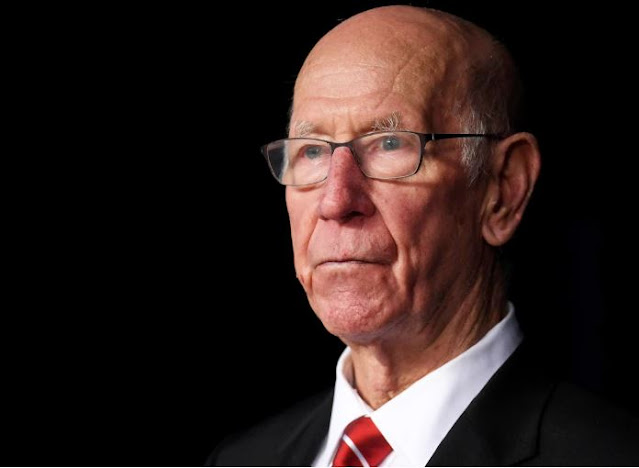Bobby Charlton, Iconic English Footballer, Passes Away at 86
Bobby Charlton, Iconic English Footballer, Passes Away at 86
Bobby Charlton, a revered figure in English soccer, who not only survived a devastating plane crash that struck a Manchester United team poised for greatness but also played a pivotal role in England's historic 1966 World Cup victory, has passed away at the age of 86.
The news of his passing was confirmed through a statement released by Charlton's family, as conveyed by Manchester United.
A supremely talented midfielder renowned for his powerful shots, Charlton held the distinction of being the leading scorer for both Manchester United (with 249 goals) and the England national team (with 49 goals) for over four decades until Wayne Rooney eclipsed his records.
Manchester United, in their tribute to Charlton, described him as a "hero to millions" across the globe, praising not just his footballing prowess but also his sportsmanship, integrity, and his indomitable legacy as a giant of the game.
Former Manchester United manager, Sir Alex Ferguson, hailed Charlton as the greatest player ever to don the red jersey of the club, an accolade that speaks volumes about Charlton's influence on the team's rich history.
Charlton's appeal extended beyond his footballing skills; he was admired for his humility, discipline, and sportsmanship. Remarkably, he never received a red card during his 758 appearances for Manchester United from 1956 to 1973, or in his 106 international caps for the England national team from 1958 to 1970.
Charlton formed an iconic triumvirate with George Best and Denis Law, known as the "Trinity," leading Manchester United to their European Cup victory in 1968. Their journey to that triumph included surviving the 1958 Munich air crash, which tragically claimed the lives of the celebrated "Busby Babes" team. Over his career, Charlton secured three English league titles with Manchester United, along with an FA Cup.
In the 1966 World Cup, Charlton played a pivotal role in England's success, standing out in the semifinals by scoring twice against Portugal to secure a spot in the final. England ultimately triumphed over West Germany 4-2 after extra time.
Even though Ryan Giggs eventually surpassed Charlton's appearance record for Manchester United in 2008, Charlton's goal-scoring record for the club remained unbroken for another nine years. It wasn't until 2017, 44 years after Charlton's retirement, that Wayne Rooney achieved his 250th goal for the club.
Upon retiring from professional play in 1973, Charlton ventured into coaching and founded a youth development program that included future stars like David Beckham. He also briefly managed clubs such as Preston, Wigan, and Irish side Waterford.
In 1984, Bobby Charlton returned to Manchester United as a director and played a pivotal role in appointing Sir Alex Ferguson as the club's manager in 1986. This decision ushered in an era of unprecedented success, with Ferguson guiding the team to 38 trophies over his nearly 27-year tenure.
Knighted by Queen Elizabeth II in 1994, Charlton remains an enduring presence at Old Trafford, immortalized alongside George Best and Denis Law in a statue outside Manchester United's stadium.
Charlton's legacy stands apart for his ability to transcend the fierce rivalries and tribalism of club and international football, endearing him to fans across the spectrum.
Born on October 11, 1937, in Ashington, a coal-mining town in northeastern England, Charlton's prodigious talent was evident from a young age. His older brother, Jack, who also played for the national team and shared the 1966 World Cup victory, recognized Bobby's extraordinary potential as a player from the tender age of 5.
The journey from their modest beginnings to global stardom was marked by resilience and determination. The Charlton family sometimes relied on catching illegally acquired salmon or rabbits to stave off hunger. His father, Robert Charlton Sr., scoured the local beaches for washed-up coal to supplement the family's income.
Remarkably, even after surviving the 1958 Munich air crash, in which he helped fellow survivors, Bobby Charlton remained committed to preserving the memories of the disaster's victims. He returned to the pitch less than four weeks after the tragedy, contributing to Manchester United's run to the FA Cup final that season.
Charlton's dedication to his club extended beyond the traumatic crash, and he played a central role in helping Manchester United rebuild. The 1965 and 1967 English league titles joined the championship they had won in 1957, and the pinnacle of his club career came in 1968 when Manchester United became the first English club to be crowned champions of Europe. Charlton's two goals in the final against Benfica secured this historic achievement.
However, it is perhaps Bobby Charlton's role in England's 1966 World Cup victory that remains etched in history as the country's sole major title in men's football. Despite the ups and downs in his relationship with his brother Jack, the 1966 World Cup triumph remained a shared memory that brought them together.
In November 2020, it was revealed that Charlton had been diagnosed with dementia, a condition that also afflicted his brother and fellow World Cup winner, Nobby Stiles. His legacy as a footballer, mentor, and beloved figure will endure as a testament to his extraordinary career and sportsmanship, with fans, fellow players, and the footballing world celebrating the life of a true legend.





